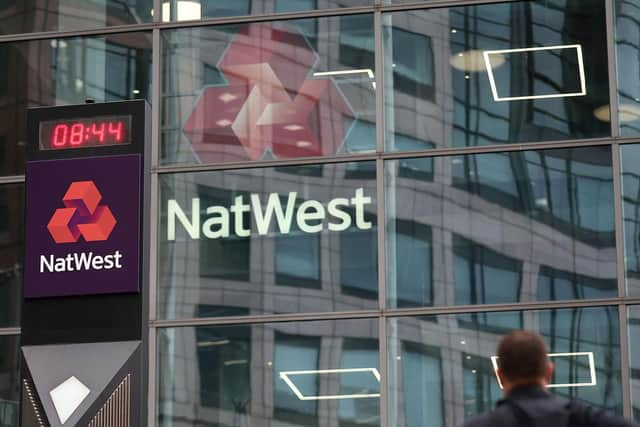NatWest Nigel Farage: The threat from being debanked is far bigger than the public realises - Brian Monteith
This would be as foolishly naïve as it is wrong, for ultimately, every single one of us is a potential target for those wishing to control our every action, from what we say to what we spend our own money on.
Love him or loath him, all of us should be pleased Nigel Farage’s revelation about how his former bank withdrew its services and other banks conspired to prevent him having an alternative means of doing business has resulted in the resignations of the Chief Executives Nat West and its Coutts & Co subsidiary.
Advertisement
Hide AdAdvertisement
Hide AdI would have preferred the Nat West board to have protected the interests of its customers and shareholders by sacking its CEO, Dame Alison Rose. Once she admitted briefing private details of Nigel Farage’s accounts to the BBC there was no alternative but for her to go. That the Nat West board thought it possible she could remain in her £5m-a-year executive post is as alarming as Rose’s behaviour.


The chairman of Nat West, Sir Harold Davies, and those board members who supported Rose, should all go voluntarily – or the majority shareholder, the UK Government, must act on behalf of the British people and demand they go now.
The dismissals can be justified as gross misconduct and gross errors of judgement leading to exits without compensation. Only by taking such justifiably firm action can all banks have a hope of regaining the confidence of the people they serve and that own them – and that is all of us.
The evidence from Coutts’ own 40-plus page review of Nigel Farage’s account made it clear it remained commercially viable but that his views – or, more accurately, the perception of his views – were the real problem and he must be debanked. The offer of an alternative private account via Nat West, did not extend to providing a replacement for Farage’s business account and was nothing other than a lame deflection.
The problem of being debanked for one’s views is not new, but has been going on for years, with many people I know of who have been affected. The problem has always been trying to prove the motives of the banks, for the reality is they can easily use anti-money laundering laws as a cover for not providing answers about why banking services have been withdrawn. They simply say they are not allowed to disclose their reasons (for it may alert a customer to the possibility of being the subject of a police inquiry, allowing the customer to alter behaviour or dispose of evidence).
Back in 2016 I helped Richard Tice, a successful CEO of a commercial property business to form a campaign called “Leave Means Leave” to lobby Theresa May’s government to leave the single market and the customs union. It proved impossible to obtain a bank account, making it difficult to receive donations and settle bills for work done and pay staff costs. It was to become one of many more examples I witnessed.
Richard Tice later became an MEP colleague of mine when we were both elected to the European Parliament and he is now the leader of the Reform Party, the rebranded Brexit Party that won the largest share of the 2019 European Elections vote in the UK. I also know a number of my fellow Brexit Party MEPs had their bank accounts closed, shortly after becoming MEPs or after completing their seven-month stint. This extended not just to themselves but to their spouses and other members of their family, in some cases putting their business ventures and livelihoods at risk.
One MEP I know saw his RBS business account of twenty-five years and his wife’s RBS personal account of over forty years summarily closed with no explanation being given, the wife received two bottles of wine and much puzzled sympathy from RBS staff as a recognition (without prejudice) of the bank’s poor service.
Advertisement
Hide AdAdvertisement
Hide AdLikewise, it has been fairly common knowledge that when Lawrence Fox, actor and candidate for London Mayor in 2021, established the “Reclaim” party he could not obtain a bank account, despite it being recognised by the Electoral Commission as a bona fide political party.
There is too much of a coincidence for all that to have happened to people I know who have done nothing other than share mainstream political views that often represent what the majority of the British public believe and support. Nevertheless it is not just about their views – as the revelation that Gina Miller also has suffered at the hands of the banks – with the bank account for her “True and Fair” party being closed.
There needs to be a complete overhaul of the banking laws that allow such social exclusion to take place, but it must go further, for the whole matter could yet take a more sinister turn.
It is the policy of the Government and the Bank of England to introduce a British digital currency and move towards a cashless society. Such a destination must be resisted before it becomes a very short step from monitoring what people do with their money and where they spend it – to combine this with what they say (implying how they may vote). Banks will become agents of future governments, able to deny transactions they disprove of.
The threat from being debanked goes far deeper than the fate of Nigel Farage or any current politicians, but ultimately asks the question “who controls our money and what we do with it?” – putting us all at risk of being debanked into non-persons.
Comments
Want to join the conversation? Please or to comment on this article.